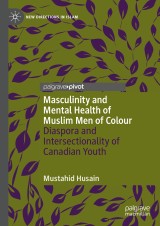Details

Masculinity and Mental Health of Muslim Men of Colour
Diaspora and Intersectionality of Canadian YouthNew Directions in Islam
|
CHF 48.00 |
|
| Verlag: | Palgrave Macmillan |
| Format: | |
| Veröffentl.: | 20.09.2024 |
| ISBN/EAN: | 9783031686863 |
| Sprache: | englisch |
| Anzahl Seiten: | 120 |
Dieses eBook enthält ein Wasserzeichen.
Beschreibungen
<p>This book delves into the complexities of masculinity, mental health, and cultural identity among young Bangladeshi-Canadian men. Employing an anthropological, intersectional approach, it scrutinizes the interplay of neoliberal ideologies, Islamic values, and diasporic experiences in shaping their masculine trajectories. The study unravels the intergenerational trauma, parental pressures, and societal expectations that contribute to their deteriorating mental well-being. With a unique insider perspective and rich empirical data, this book fills a crucial gap in the literature by offering invaluable insights for scholars exploring the nuances of migration, ethnicity, gender, and psychological resilience. Strikingly, the author proposes evidence-based interventions and policy recommendations to address the mental health struggles of this underserved population, making it a must-read for academics and students in diaspora studies, migration studies, sociology of race and ethnicity, gender studies, anthropology, political science and development studies, as well as NGOs and policymakers alike.</p>
<p>Chapter 1: Introduction.- Chapter 2: Research Context, Theoretical Influence and Methodology.- Chapter 3: Class Formations in Bangladeshi-Canadian Diaspora.- Chapter 4: Masculinity and Powerlessness in Bangladeshi-Canadian Youth.- Chapter 5: Bangladeshi-Canadian Youth and Parents - Intersectional Issues and Opportunities.- Chapter 6: Youth Migrant Workers – Class and Intersectionality.- Chapter 7: Contributions to Policy-Making.- Chapter 8: Advocacy Groups, NGOs and Social Movements.- Chapter 9: Conclusion.</p>
<p><strong>Mustahid Husain</strong> is Postdoctoral Fellow at the Department of Anthropology, University of Toronto, Canada. His scholarly interests intersect digital, feminist, and socio-cultural anthropology spanning global political economy, masculinity's impact on mental health, and social justice and governance. Driven by community engagement and visual participatory action research, Husain's ongoing work investigates how Muslim masculinities are shaped by intergenerational dynamics and male dominance within diasporic contexts, and how these emergent masculinities influence mental health outcomes. His latest monograph is <em>Development, Neoliberalism, and Islamism in South Asia: The Case of Bangladesh</em> (Palgrave Macmillan 2022). </p>
<p> </p>
<p> </p>
<p>This book delves into the complexities of masculinity, mental health, and cultural identity among young Bangladeshi-Canadian men. Employing an anthropological, intersectional approach, it scrutinizes the interplay of neoliberal ideologies, Islamic values, and diasporic experiences in shaping their masculine trajectories. The study unravels the intergenerational trauma, parental pressures, and societal expectations that contribute to their deteriorating mental well-being. With a unique insider perspective and rich empirical data, this book fills a crucial gap in the literature by offering invaluable insights for scholars exploring the nuances of migration, ethnicity, gender, and psychological resilience. Strikingly, the author proposes evidence-based interventions and policy recommendations to address the mental health struggles of this underserved population, making it a must-read for academics and students in diaspora studies, migration studies, sociology of race and ethnicity, gender studies, anthropology, political science and development studies, as well as NGOs and policymakers alike.</p>
<p><strong>Mustahid Husain</strong> is Postdoctoral Fellow at the Department of Anthropology, University of Toronto, Canada. His scholarly interests intersect digital, feminist, and socio-cultural anthropology spanning global political economy, masculinity's impact on mental health, and social justice and governance. Driven by community engagement and visual participatory action research, Husain's ongoing work investigates how Muslim masculinities are shaped by intergenerational dynamics and male dominance within diasporic contexts, and how these emergent masculinities influence mental health outcomes. His latest monograph is <em>Development, Neoliberalism, and Islamism in South Asia: The Case of Bangladesh</em> (Palgrave Macmillan 2022). </p>
<p><strong>Mustahid Husain</strong> is Postdoctoral Fellow at the Department of Anthropology, University of Toronto, Canada. His scholarly interests intersect digital, feminist, and socio-cultural anthropology spanning global political economy, masculinity's impact on mental health, and social justice and governance. Driven by community engagement and visual participatory action research, Husain's ongoing work investigates how Muslim masculinities are shaped by intergenerational dynamics and male dominance within diasporic contexts, and how these emergent masculinities influence mental health outcomes. His latest monograph is <em>Development, Neoliberalism, and Islamism in South Asia: The Case of Bangladesh</em> (Palgrave Macmillan 2022). </p>
Unpacks the socio-cultural factors that contribute to poor mental health of male Bangladeshi-Canadian youth Explores the connection between recuperative masculinity and Islamic neoliberalism Proposes community-based solutions to support the mental health of diaspora youth, using an intersectional lens

















